18: on sifnos
and something about sharing our travels online
I had originally planned to share something else today, but this month (year?) has taught me that plans are frequently best abandoned. In that spirit, here is something different that’s been on my mind lately about my first week in the Cyclades on the island of Sifnos.
I often find myself writing about firsts and the power of a first experience because there is something that happens, I think, when we’re in a completely new place experiencing something for the first time. Travel presents those opportunities on a plate, and it can range anywhere from a first time in a new country (big experience) to something smaller, like eating a new dish you suddenly are left wondering how you’ve survived your entire life without. I am someone who wishes I could fall into a routine and find an appreciation for the subtle differences in the sameness of regular life, but I just can’t. These new experiences, when I find myself in a very different place from home, are, for better or worse, a large part of what I live for.
I had a vague at best sense of what to expect from Sifnos and the Cyclades in general as I stood in front of a weather-beaten sheet of paper and began dialing phone numbers. These numbers, as a friend who had previously visited the island told me, are for the nine taxis that operate on Sifnos. “Go down the list, one will answer eventually”, was the advice given to me. By the time I reached the fourth number and continued only to get answering machines in Greek, I started to worry. The other passengers on my ferry who disembarked with me all seemed to have plans, whether that was a prearranged ride that picked them up at the port in Kamares or a hotel within walking distance. My apartment, a small hole in an old Cycladic home, was about five miles away across a mountainous expanse that I struggled to imagine even a car crossing. This was a departure from my backpacking in Southeast Asia and I had with me, to my slight embarrassment, a wheeled carry-on suitcase instead of my 40L backpack. I was not going to be rolling that five miles across any mountain roads.
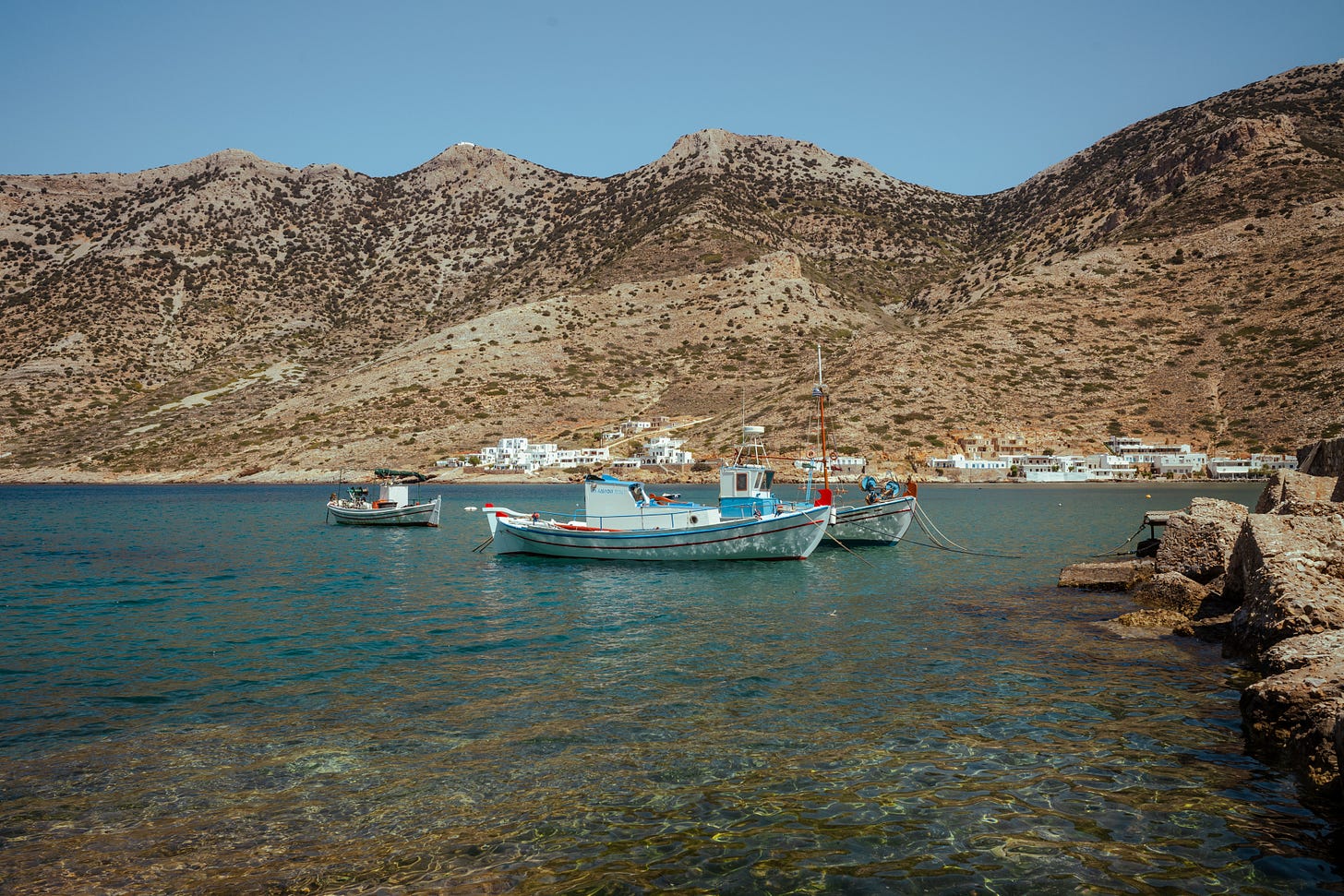
Spirits were lifted when an answer came on my fifth call. A woman greeted me with a series of questions and asked where I’d be going, to which I replied, Kastro. At that point, she regretfully let me know she was not available to drive at that time. I smiled and wondered why it was worth asking where I was going if she wasn’t available, then thanked her before dialing the sixth number. No one was available there, either, but on the seventh call, the dial tone stopped. Another woman, more severe, answered the phone and communicated in a one-word question/answer style before letting me know she’d be there in 20 minutes. Feeling relieved that my somewhat poor planning did not result in catastrophic failure, I thanked whatever travel god is out there for keeping me on my toes and schlepped my bag over to a rock where I sat and stared into some of the clearest, blue water I’ve ever witnessed. Out in the harbor, a fisherman negotiated his way through a yellow fishing net strung over the side of a white boat that bobbed up in down in the cerulean waters.
As promised, my driver arrived about 20 minutes later in a battered hatchback, which she popped open for me to drop my bag amidst what could only accurately be described as a mobile yard sale. I smushed the top down and hopped into the back seat, where I was greeted with a warm kalimera by my driver, who was on the phone as all good taxi drivers across the globe tend to be. We sped off, and I watched as the port town shrank beneath us while we climbed the winding mountain roads. Soon enough, the drive leveled out, and I could see fields of golden grass blowing against a panoramic view of the sea. The quintessential image of Greek islands that I had in my mind was now in front of me, and it was far better than anything I had ever seen in a photograph. Windswept, glistening hills, sundrenched villas with laundry hanging in the breeze, and that unending blue. I quickly learned that the line between sea and sky becomes hard to distinguish in the Cyclades.
When we finally arrived in Kastro, my driver swiftly turned the car around and drove in reverse up a hill I would have struggled to go up facing forward. From there, the road ended, and I was left to climb a series of stairs and pathways in this ancient, 14th-century settlement. I made my way to the door of the home I was staying in and dropped my bags in a real-life hobbit home of my dreams. Wooden beams set into the white plaster accented the one-room home, which had a small kitchen, dining table, bathroom, and two twin beds with beautiful stone floors and a few tiny windows. Embroidered tableclothes, French doors, white curtains, ancient appliances—all the makings of a perfect home by the sea. The house itself was set into the hill, which I soon realized provided a natural air conditioning system to combat the stifling Greek summer heat. I washed my hands and face after opening my bag and set out for a walk through the town.
From this point, I spent a lot of time walking in such a small place as I waited for my next recommendation, Kavos Sunrise, to open. The views in Kastro from the high path that runs along the edge of a cliff are some of the most beautiful in the Cyclades. Eventually, I found my way to the steps that wound down to the Church of the Seven Martyrs, an iconic monastery set on a rock above the sea. It was easy to see how most people spend a day or even a few hours in Sifnos, but I’ve realized over the years that these are the places I love. A small touristic town after the crowds disappear (although in this case, I was one of about six people in the village since it was the end of May and not yet tourist season) is something I’ve grown to appreciate. I walked on through the maze of streets until I started to feel hungry, at which point, I followed a zig-zag path down the hill that Kastro is set on to a small cove below where there were a few fishing shacks and one restaurant.
I settled down for dinner at that restaurant (named Cantina), which appeared to be celebrating its first opening day of the season. Stumbling upon this spot was somewhat of an easy find since it was one of two places open in Kastro, and I ordered what felt like everything good and sacred about this world: wine, bread, a smoked eggplant mousse, grilled calamari with a fava bean dip, and local, small fish. I was told by my host in Athens that the small fish from any taverna on Sifnos were something I needed to try. The sun dipped behind the village above me, and the sky turned a dusky purple as the air grew colder and I felt warmer. 20 feet or so away from my table, waves lapped against the rocky beach on which the restaurant was set. I’m going to be honest with you since you’ve already made it quite a way through: there’s no conflict in this story.
My first day in Sifnos already felt like a completed dream. All that was left to do was climb back up the path into the village to 1) eventually get home and 2) more importantly, visit Kavos Sunrise. This bar was less of a recommendation and more of a if you go to one place on Sifnos, make sure it’s this one. Kavos Sunrise, or more locally known as “the Cubano,” is truly unlike any other bar I’ve been to. Identified at first sight by the piles and piles of Havana Club bottles scattered around outside, Kavos Sunrise is owned by a man who feels as if he must be from another century, one where we didn’t do much else besides make bets with the sea all day and drink through our nights beside flickering lamplight. He could be somewhere between the ages of 52 and 92 if I had to guess.
There are a handful of travel articles and newspaper stories online about the Cubano, all of which offer some variations on the lore. Essentially, the Cubano is this: a tiny bar that only serves rum, set in a Cycladic home on the edge of a cliff, which also happens to be a museum to Che Guevara, Fidel Castro, and Cuba, owned by a man in a red bandana. The owner, Kostas, once traveled to Cuba and lived there for a few months before returning home. He loved the place and the Caribbean so much, he decided to build a bar about it. Without wasting any more words, I will say that it’s a place you simply need to visit to appreciate but might not ever understand, and that’s what makes it great.
I sat on the terrace outside the bar for hours and drank rum and cokes. Around 1 am, as if out of nowhere, a handful of younger Ukrainian guys showed up and continued their drinking that clearly began somewhere else. Through all of this, Kostas remained on his corded telephone, shouting and gesticulating like someone on the floor of the NYSE circa 1988. I chatted with the few people there, our common amazement at this scene bringing us together. The Ukrainian guys were visiting as what sounded like a small vacation before working in the islands for the summer. I felt stupid, as I frequently do, for not being able to effortlessly maneuver two or more languages within one conversation. I was growing tired since I’d been up before 6 am that morning to catch the ferry, and I eventually made my goodbyes. Kostas remained inside, on the phone, in the middle of the night.
I read a NYT piece this week titled The Travel Writer’s Dilemma: Share, or Gatekeep?. In it, the author Pico Iyer poses the pretty straightforward problem we’re all faced with when we share our hidden travel gems on the internet. I’ve never worried about this all that much because I simply don’t have an audience like Iyer, but I stopped using specific geotags years ago because I found them to (probably) be more damaging than helpful. There are places I’ve traveled that I won’t share online simply because I am worried about them, and I don’t think the internet needs another piece of content advocating that someone go now before its too late. If someone reaches out to me with travel questions, I ask for their email and send them a list of recommendations without holding back. I don’t believe in gatekeeping, but I do believe in managing a bar that filters out at least some of the people who aren’t willing to make an effort to research a place for themselves. My potentially naive mind tells me that those people will also probably not make much of an effort to take care of a place, to be respectful of those who live there, and to try to at least never leave it worse than when they arrived.
What’s been interesting to me over the last ten years of this being a significant problem (let’s just blame Instagram for this one, too) is how short people’s attention spans are with a place. Iceland, once the hottest destination for everyone to flock to, feels like it’s lost its spotlight. I quietly love that because I adore Iceland and will continue to visit as often as I can. When I visited Japan almost 10 years ago, the country was under no circumstances facing overtourism, and now it’s all I seem to read about. With this in mind, I guess the best any of us who care about traveling responsibly can do is resist, to some extent, the allure of popular places. Eventually, they too will be passed over for the next popular place, and then we can visit them again. Greece, in general, is wildly popular, but the overwhelming majority of people visiting are heading to a few of the hundreds of islands out there. There’s still room, I think, to explore further.
I think it’s pretentious in today’s day and age to imagine that any of us are discovering much of anything. We are all working off sources, whether it’s a Google/Yelp review, a blog, or a friend’s recommendation. Most of what I did on Sifnos was a recommendation. It’s a slippery and complex slope to think about the impact sharing something online might have on a place. Sifnos is pretty well known and by no means off the beaten path (as evidenced by the existence of at least one Condé Nast story), but I was still one of only 20 people or so who got off the ferry there as it made its way to more popular islands. I can’t speak for the future, but for now, it still feels undisturbed enough. On Sifnos, there is a simplicity that I think will naturally deter crowds because there just isn’t all that much to do but sit by the sea, have a good meal, or wonder about a life like Kostas’. Whenever I am bored or frustrated with something at home, I let my mind wander off to Sifnos and look at the time, making an adjustment in my head for the time difference. Silently, I think to myself: at this hour, regardless of the time, I bet he’s still on the phone.



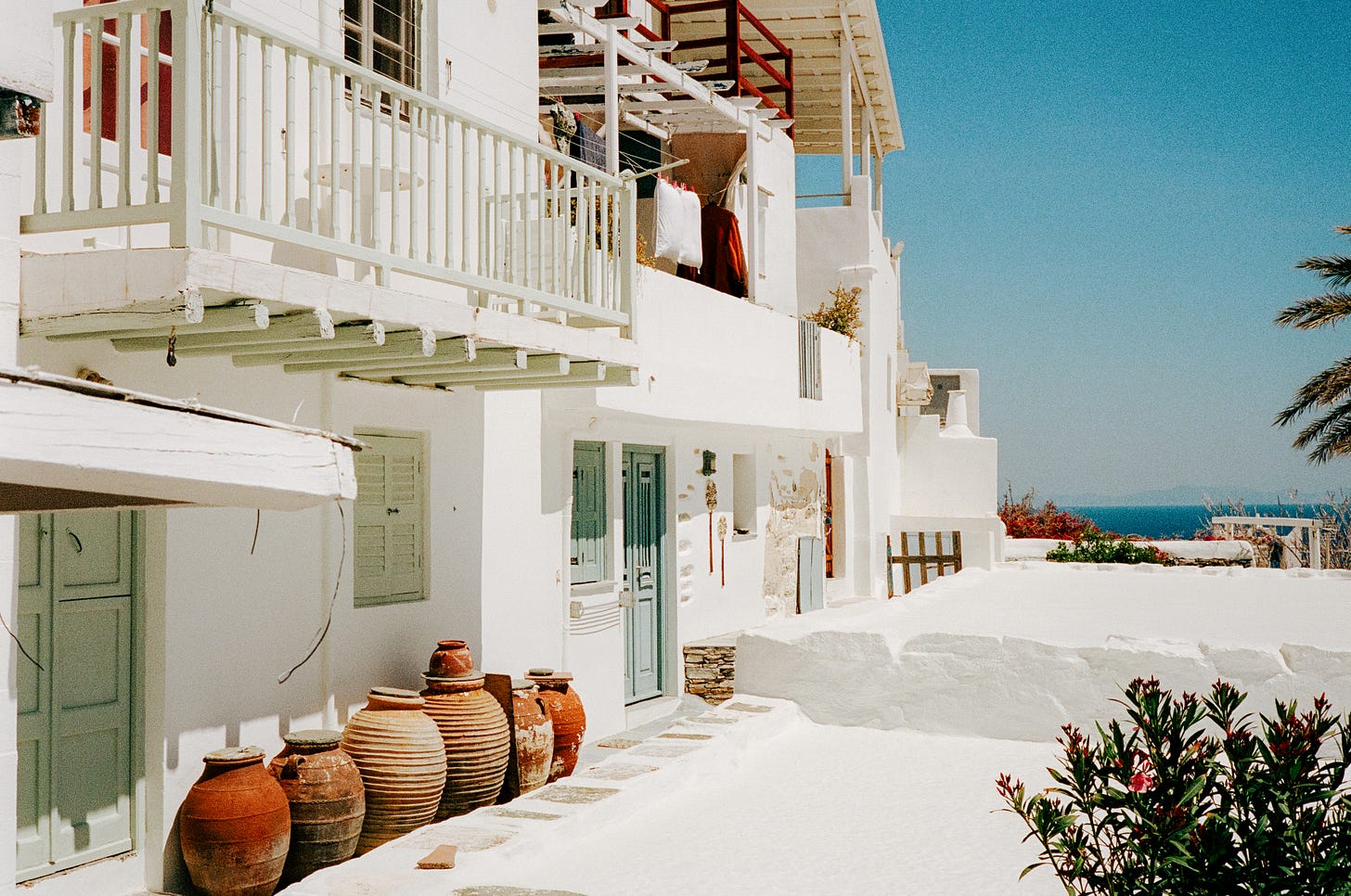
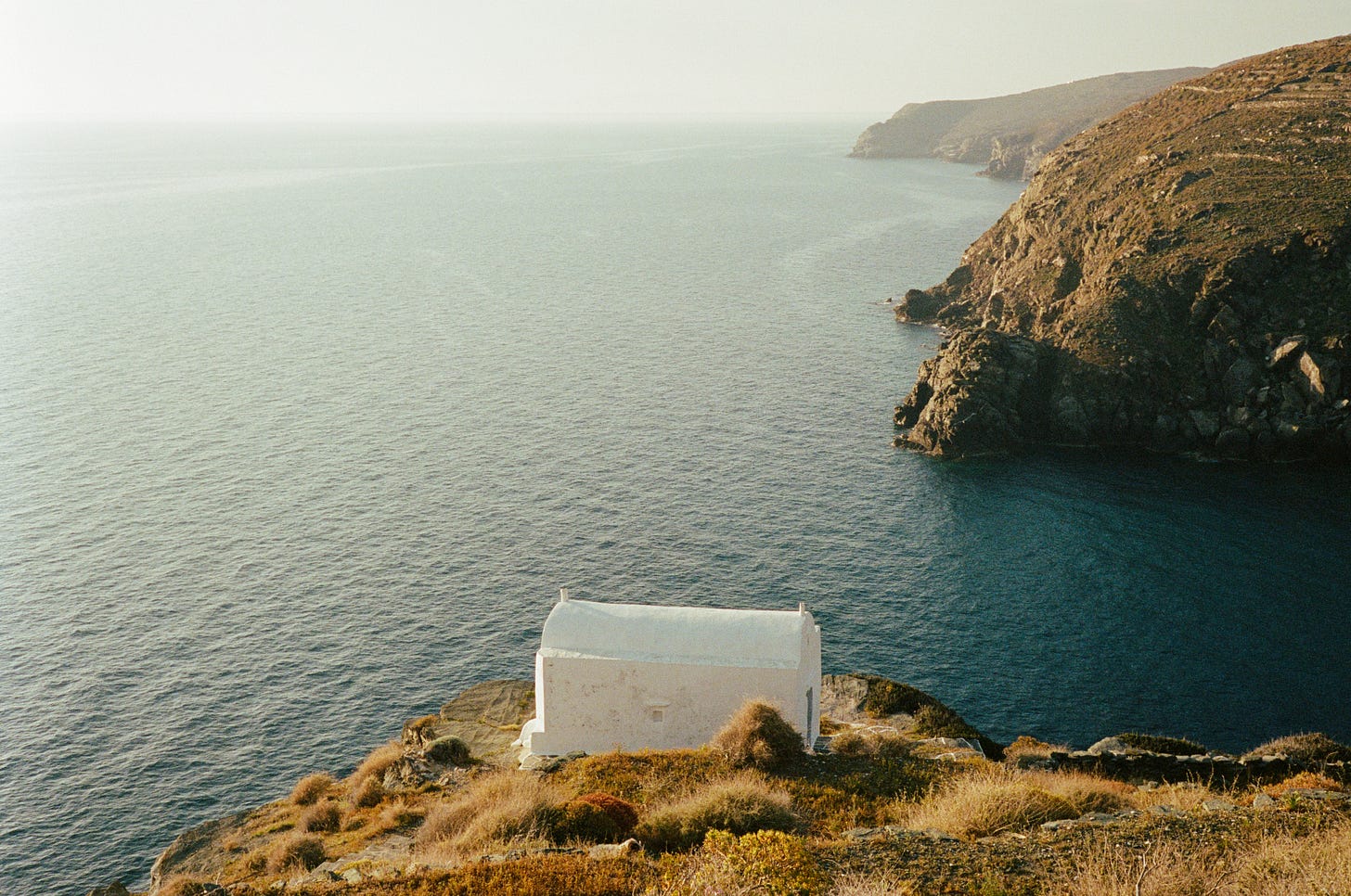
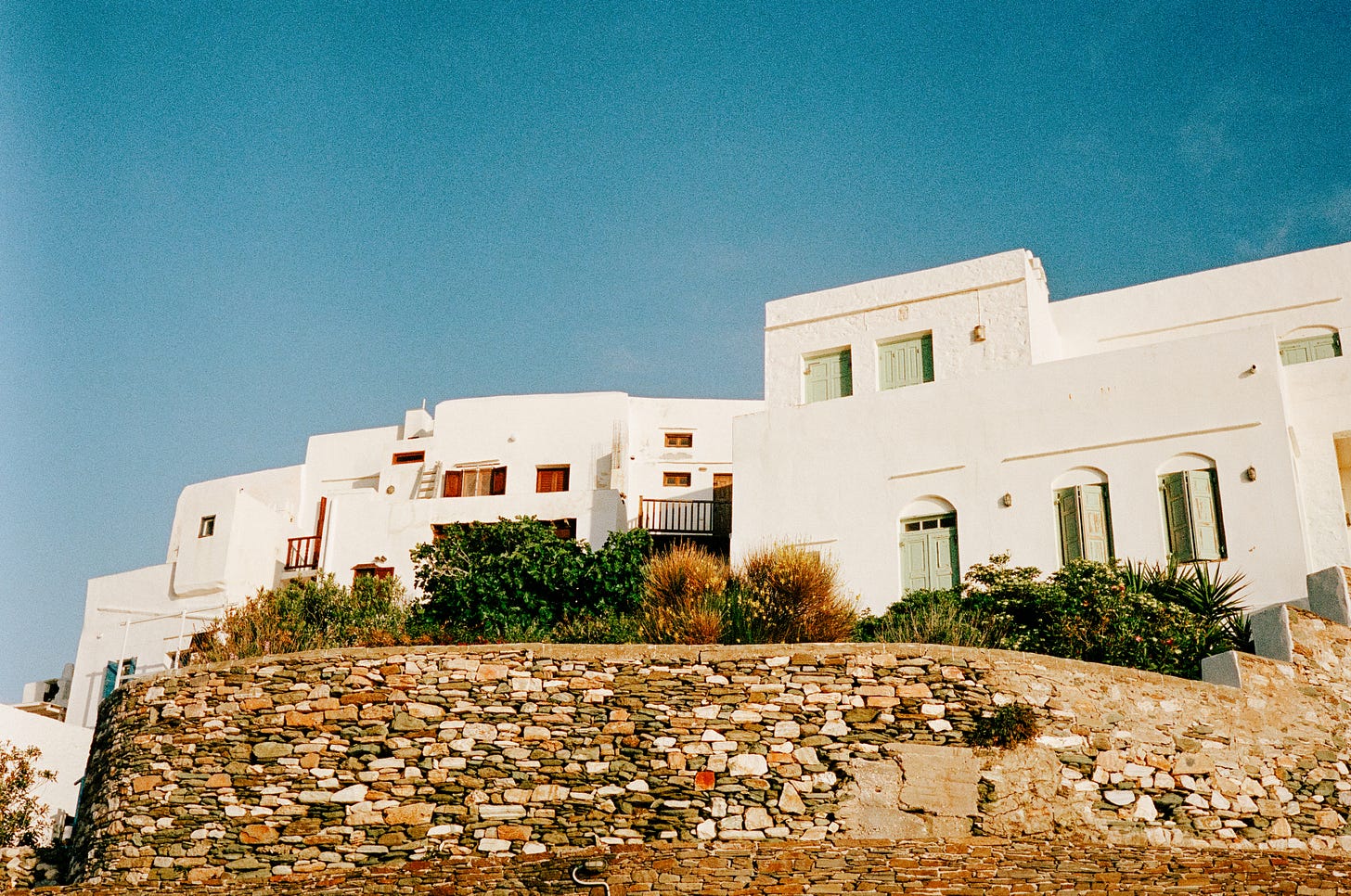
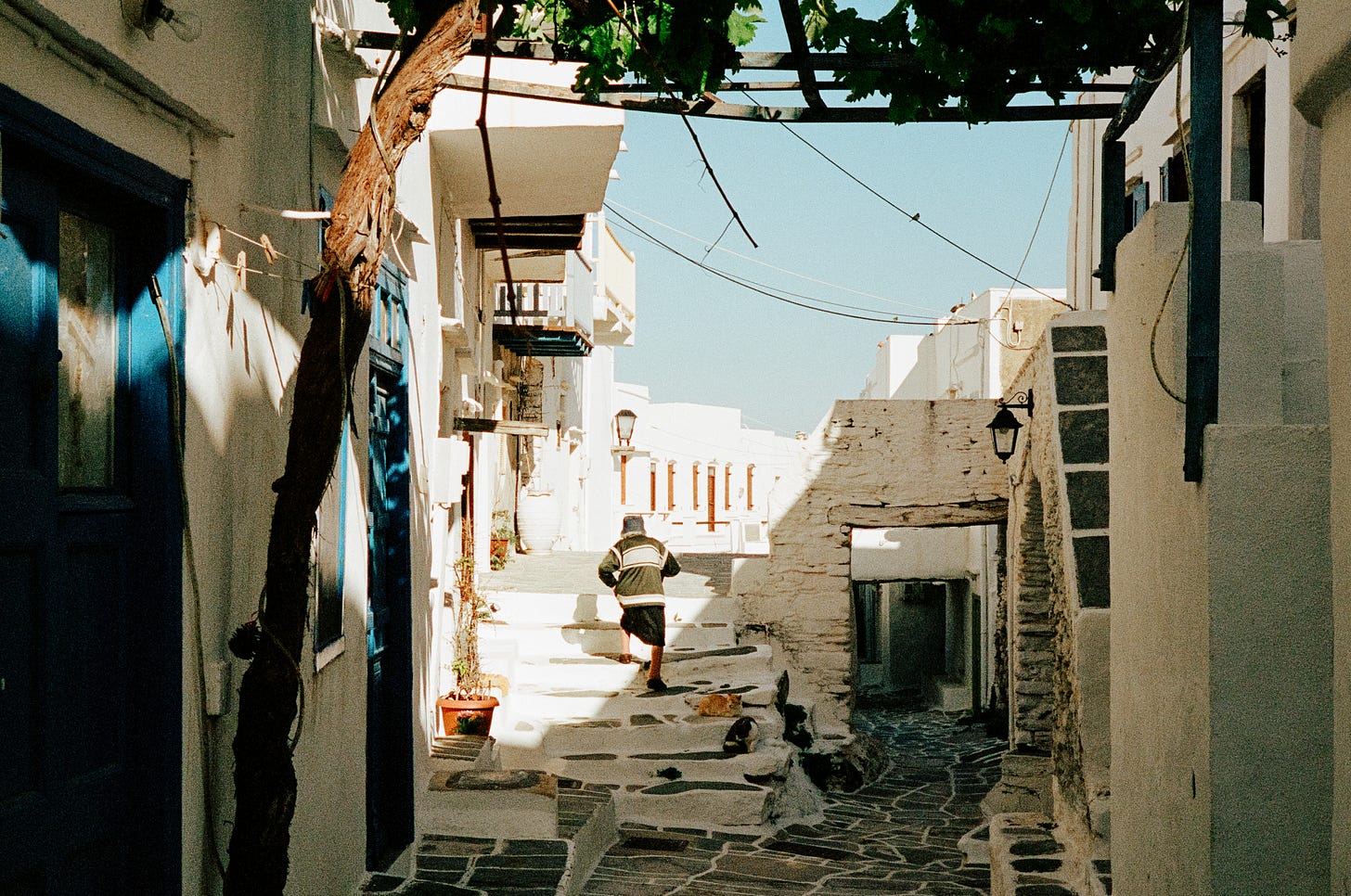



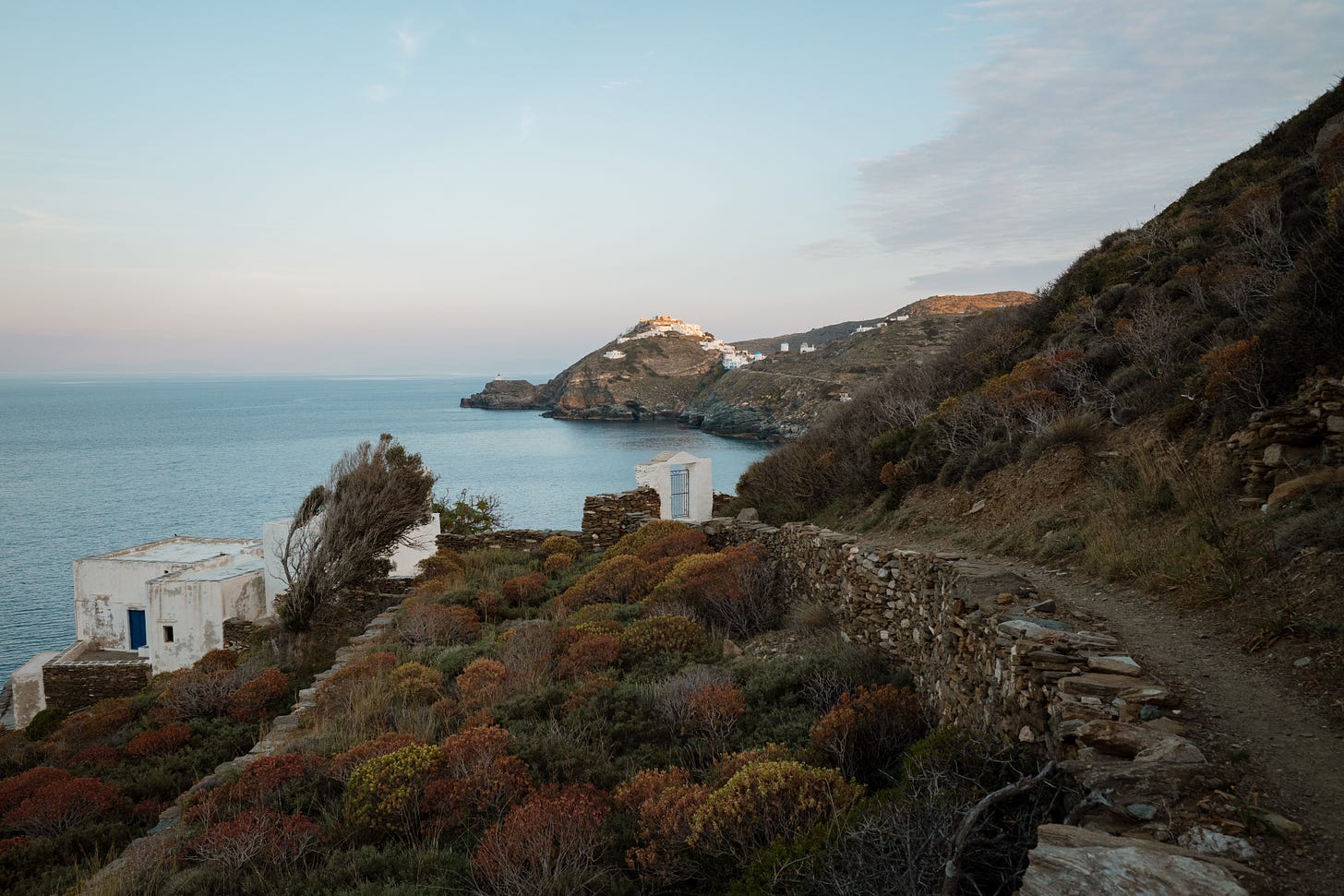

That's one of your most beautiful pieces so far. Kostas must have been quite a character. I felt jelly about how lucky you have been to visit this place.
As for Pico Iyer's take on whether we should share our findings, I have been having similar sentiments lately about Barcelona. Locals keep moaning about overtourism as the source of their problems, but the sad reality is all these problems have their root causes in anything but tourism.
Still, I feel reluctant to write about some of my favourite spots that are tranquil and off the beaten path, even though that's what I love writing about - offbeat places.
Great read.